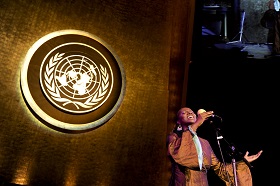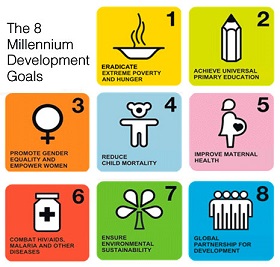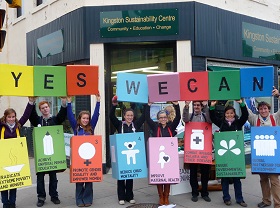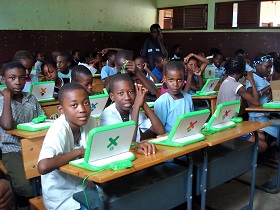The United Nations Sustainable Development Summit, during which the post-2015 development agenda is to be adopted, will be held from 25 to 27 September 2015 as part of the General Assembly’s 70th anniversary session. The document "Transforming Our World: The 2030 Agenda for Sustainable Development" contains a comprehensive action plan for a global development strategy and will come into effect on 1 January 2016.
Implementation of the Millennium Development Goals
The United Nations' idea of uniting efforts to draw out common development goals has deep historical roots. The first United Nations Development Decade, adopted in 1961, a so-called programme of international economic cooperation, was focused on promoting economic growth of the Member States.
Development Decades paved the way for adoption of the United Nations Millennium Declaration on 8 September 2000 during the Millennium Summit, which brought together 185 Heads of State and Government, including Russian President Putin.
The road map for implementing the United Nations Millennium Declaration was adopted in 2001. It contained 8 goals, 18 targets and 48 indicators for measuring progress in meeting the goals, named the Millennium Development Goals (MDGs). Among them were to:
- eradicate extreme poverty and hunger;
- achieve universal primary education;
- promote gender equality and empower women;
- reduce child mortality;
- improve maternal health;
- combat HIV/AIDS, malaria and other diseases;
- ensure environmental sustainability;
- develop a global partnership for development.
All the goals were drawn up basing on the development level in 1990 as the starting point and set to be achieved by the end of 2015.
The importance of the MDGs can be seen from the fact that they led to a growth of official development assistance (a marked increase in funds allocated by developed countries to resolving the problems of developing countries) and set the tone in the field of international development assistance.
At the end of 2014, United Nations Secretary-General Ban Ki-moon presented a report on the progress towards achieving the Millennium Development Goals drawn up in the Millennium Declaration. According to the report, the number of people living in extreme poverty all over the world had halved, from 1.9 bn in 1990 to 836 m in 2015. The most significant progress has been recorded since 2000.
The number of out-of-school children of primary school age worldwide dropped by almost half, from 100 m in 2000 to an estimated 57 m in 2015.
Since the beginning of the 1990s, the rate of reducing mortality for children under age five has more than trebled.
Since 1990, the maternal mortality ratio has dropped by 45%, with the main decline reported since 2000.
Between 2000 and 2014, developed countries' official development assistance rose by 66% in real terms, reaching 135.2 bn US dollars.
Yet, during the last years, the MDGs faced criticism for a simplified approach towards development processes and a narrow focus on their social aspects. It has been argued that the procedure for adopting the MDGs was not an open or representative one and that the goals' agenda represents mainly the donors' viewpoint on development.
New Horizons for Sustainable Development
To avoid new accusations of secrecy, the United Nations has taken a few steps to ensure representative consensus on the post-2015 UN development agenda. In January 2015, Ban Ki-moon established the UN System Task Team, which brought together over 60 UN entities and agencies. The group was aimed at providing analytical input, expertise and outreach to the post-2015 development agenda.
During the negotiations on the text of the Global Agenda, the Russian delegation urged that the future strategy be similar to the United Nations Conference on Sustainable Development (Rio+20), which took place in Rio de Janeiro in June 2012, and to its final document "The future we want" (http://www.un.org/ru/documents/ods.asp?m=A/RES/66/288). This document affirmed " the key multilateral agreements and future obligations of countries in social, economic and environmental fields".
One of the main results of Rio+20 was the Member States' commitment to developing a set of goals promoting target and coordinated actions in sustainable development (SDGs). Subject to the agreements reached at Rio+20, drawing up of SDGs and development of an action strategy for the post-2015 development agenda must be coordinated. The Open Working Group on Sustainable Development Goals was charged with this task. The recommendations provided by the Group and recognised in the United Nations General Assembly resolution 68/309 of 10 September 2014 formed the basis for the Global Development Agenda beyond 2015.
In July 2012, the UN Secretary-General formed the High-Level Panel of Eminent Persons on the Post-2015 Development Agenda, which contributed materially to drafting the Global Agenda. Elvira Nabiullina, who then held the post of adviser to the Russian President, was a member of the High-Level Panel, this indicating the critical involvement of the Russian side.
It was the Russian side's understanding that the Global Agenda should confirm the central role of the United Nations as the only universal platform for developing mutually acceptable solutions to global problems and promoting the concept of sustainable development. This concept is aimed at establishing "a stable, safe, fair and democratic system of international relations recognising equal partnership between states, complying with the principles and goals of the UN Charter".
In response to the two-year negotiation process, the Member States finalised the draft Global Development Agenda beyond 2015, which is awaiting adoption during the forthcoming United Nations Sustainable Development Summit on 25–27 September 2015. The document envisages achievement of 17 new sustainable development goals and 169 targets. They include eradicating poverty, ensuring healthy lives, achieving gender equality, combating climate change, facilitating economic growth and creating jobs, ensuring access to modern energy for all, ensuring availability of water and sanitation for all, and making cities and human settlements safe by 2030.
"Today is the start of a new era, "said Ban Ki-moon, addressing the United Nations General Assembly on 1 September 2015 and officially presenting the outcome document.
Earlier, Ban Ki-moon said that the financial support for the Global Agenda might be affected by the sluggish global economic recovery, which was caused by new challenges, including "heightened geopolitical tension" worldwide. According to experts, 17 trn US dollars are needed for the transition to sustainable development.
Russia's involvement in achieving the SDGs
Russia makes a major contribution to development assistance. Russian financial contribution has risen significantly, from 100 m US dollars in 2004 to more than 700 m US dollars in 2013. According to the Concept of Russia's participation in international development assistance adopted in June 2007, "Russia’s policy in international development assistance will be based on the Millennium Development Goals formulated in the UN Millennium Declaration (2000)".
The Concept of the Russian Federation's state policy in the area of international development assistance (April 2014) is aimed at shaping Russia's participation in achieving the SDGs.
In January 2015, the Russian Federation and the United Nations Development Programme (UNDP) signed a Partnership Framework Agreement, which marks a full transition to Russia's role as donor to the UNDP.
For the last decade, Russia has allocated humanitarian aid to 110 countries. According to the commitments undertaken at the G8 Summit in 2005 at the Gleneagles Hotel, Russia wrote off debts of African countries worth 11.3 bn US dollars, including 2.2 bn US dollars within the initiatives in favour of highly-indebted poor countries. Furthermore, 552 bn US dollars were written off as debt-for-development swaps. In September 2012, Russia announced writing off an 11 bn US dollar debt of Democratic People's Republic of Korea and almost a 500 m dollar debt of Kyrgyzstan.
In general, Russia's 2006 G8 chairmanship, 2013 G20 chairmanship and the BRICS Summit held in July 2015 in Ufa provided a unique opportunity for Russia not only to facilitate its participation in international development assistance, but also to play a defining role in setting the global agenda in this field.
For example, the St Petersburg G20 Leaders' Declaration sets out the progress in implementing development commitments and endorses the development outlook stating core priorities, new initiatives and ongoing commitments.
The 2015 Ufa Declaration of the VII BRICS Summit reaffirms the strong commitment of its member states to the post-2015 development agenda. The document urges developed countries to honour their commitments regarding Official Development Assistance in full and on time.
Russia became one of partner founders of the New BRICS Development Bank, which is a graphic example of an innovative source of development financing in order to facilitate achieving Sthe DGs and national development agendas. The bank may become a substantial development driver in both the BRICS countries and in developing countries in general.
Russia, as an international development assistance donor, is focused on the CIS countries and, in particular, the Central Asia ones. The goal is to strengthen national infection control systems there, to provide a comprehensive supply for diagnostic laboratories and advanced training for medical specialists in order to implement Millennium Development Goal 6 ("To combat HIV/AIDS, malaria and other diseases").
Within the framework of the Global Agenda, Russia apparently needs to strengthen its leading position in the CIS as a centre for financial, intellectual and logistics assistance. Overall, the effective Russian participation in international development assistance will provide invaluable support for the efforts aimed at eradicating global tensions and conflicts, illegal drug trafficking, international terrorism and crime, particularly in neighbouring regions.








